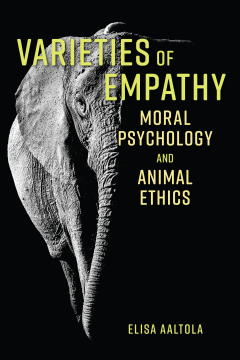
Additional Information
Book Details
Abstract
Empathy is a term used increasingly both in moral theory and animal ethics, with the suggestion that empathy enhances our moral ability and agency. Yet, its precise meaning is often left unexplored, together with the various obstacles and challenges met by an empathy-based ethic, such as those concerning the ways in which empathy is prone to bias and may also facilitate manipulation of others. These oversights render the contemporary discussion on empathy and animal ethics vulnerable to both conceptual confusion and moral simplicity. The book aims to tackle these problems by clarifying the different and even contradictory ways in which “empathy” can be defined, and by exploring the at times surprising implications the various definitions have from the viewpoint of moral agency. Its main question is: What types of empathy hinder moral ability, and what types enable us to become more morally capable in our dealings with the nonhuman world? During the contemporary era, when valuable forms of empathy are in decline, and the more hazardous, self-regarding and biased varieties of utilising empathy in the increase, this question is perhaps more important than ever.
One of the key limitations of animal ethics has been the way that the available theories separate justifications for overcoming anthropocentrism from our motivations for doing so. Rights have been pivotal, and feelings marginal. Our care, emotional responsiveness, and empathy, have been written out of the picture. Elisa Aaltola’s book serves as an important corrective. It is a major contribution to animal ethics.
Tony Milligan, Teaching Fellow in Ethics and the Philosophy of Religion at King's College London
Elisa Aaltola is Senior Lecturer in Philosophy at the University of Eastern Finland
This is a terrific resource! Aaltola provides a comprehensive taxonomy of empathy that is important for animal ethics and beyond.
Lori Gruen, William Griffin Professor of Philosophy at Wesleyan University and author of "Entangled Empathy: An Alternative Ethic for Our Relationships with Other Animals"
Varieties of Empathy is a straightforward philosophical book about ethics, and despite the title, little content is devoted in a practical sense to ethical actions toward animals. Aaltola (Univ. of Eastern Finland) takes readers through the problems that lie behind human views of animals. Present here is the danger of anthropocentricism: seeing animals as being like humans and interpreting animals' actions through the lens of what people would feel or do. But Aaltola feels strongly that cognitive empathy, or thinking about animals’ minds, does not lead to true care. Instead, she sees affective empathy, or feeling for an animal, as central to true consideration and introduces the idea of the psychopath as someone who understands the feelings of others but is simply not affected by them. In the end, she suggests, what people truly need is higher-order reflective empathy, which helps limit the influence of culture and politics and guide the use of cognitive and affective empathy. Thus, this work is not an outline of correct actions but a guide to how people ought to feel as a foundation for those actions.
Summing Up: Recommended. Graduate students, researchers, and faculty.
Table of Contents
| Section Title | Page | Action | Price |
|---|---|---|---|
| Cover | Cover | ||
| Varieties of Empathy | i | ||
| Varieties of Empathy: Moral Psychologyand Animal Ethics | iii | ||
| Contents | v | ||
| Acknowledgements | vii | ||
| Introduction: From Rationalism to Affective Morality | 1 | ||
| Notes | 15 | ||
| Chapter 1 | 17 | ||
| Good and Bad Empathy | 17 | ||
| Notes | 25 | ||
| Chapter 2 | 27 | ||
| Projective and Simulative Empathy | 27 | ||
| Definition | 27 | ||
| Projection and Anthropomorphism | 31 | ||
| Simulative Animal Narratives | 35 | ||
| Projective and Simulative Morality? | 45 | ||
| Notes | 52 | ||
| Chapter 3 | 55 | ||
| Cognitive Empathy | 55 | ||
| Definition | 57 | ||
| Moral Agency or Moral Monstrosity? | 63 | ||
| Anthropathy | 69 | ||
| Notes | 78 | ||
| Chapter 4 | 81 | ||
| Affective Empathy | 81 | ||
| Definition | 82 | ||
| Hapless Empaths and Desubjectification | 85 | ||
| Affective Moral Agency | 93 | ||
| Notes | 100 | ||
| Chapter 5 | 103 | ||
| Embodied Empathy | 103 | ||
| From Atomism to Embodied Engagement | 103 | ||
| Definition | 108 | ||
| Somatic Intersubjectivity | 113 | ||
| Embodied Moral Agency | 120 | ||
| Notes | 126 | ||
| Chapter 6 | 129 | ||
| Reflective Empathy | 129 | ||
| Definition | 131 | ||
| Cultivation and Attentiveness | 137 | ||
| Notes | 150 | ||
| Chapter 7 | 153 | ||
| Criticisms of Empathy | 153 | ||
| Biased Empathy, Biased Ethics | 155 | ||
| Empathy versus Reason | 169 | ||
| Empathy or Anger? | 185 | ||
| Compassion Fatigue | 194 | ||
| Notes | 209 | ||
| Conclusion | 217 | ||
| References | 223 | ||
| Index | 237 | ||
| About the Author | 245 |
